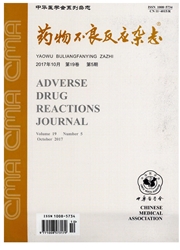

 中文摘要:
中文摘要:
干扰素多用于治疗病毒性肝炎,其显著的免疫调节作用可以引起溃疡性结肠炎、克罗恩病和缺血性结肠炎等结肠病变。干扰素相关溃疡性结肠炎较为多见,多发生于干扰素治疗后2周至数年,以腹痛、腹泻、黏液便为主要表现,肠镜检查可见结肠黏膜弥漫性水肿伴溃疡、充血,应用美沙拉秦、柳氮磺嘧啶或糖皮质激素治疗有效,多数患者症状改善后可继续干扰素治疗。干扰素相关克罗恩病较为少见,预后不佳。干扰素相关缺血性结肠炎病变多局限在降结肠,表现为纵向溃疡、黏膜水肿及糜烂出血等,停药后对症治疗,症状多于2周内缓解,并可继续干扰素治疗。
 英文摘要:
英文摘要:
The interferon is a commonly used drug which is used to treat viral hepatitis. Due to its significant role in the regulation of immune system, it can conduce to inflammatory bowel diseases, such as ulcerative colitis, Crohn~ disease, and ischemic colitis. Interferon-related ulcerative colitis is more common, generally occurs from two weeks to several years after interferon therapy, the patients complain of abdominal pain and diarrhea, mucus stool is the main manifestation. A total eolonoscopy shows diffuse mucosal edema, ulcer, and hyperemia. The patients are treated with mesalazine, sulfasalazine or glucocortieoids. Some patients may continue interferon therapy after the symptoms improved. Interferon-related Crohn's disease is rare and the prognosis is poor. Interferon-related isehemic colitis lesions generally are confined to the descending colon, long-term ulcers, mucosal edema and erosion bleeding. The symptoms are relieved within 2 weeks after interferon discontinuation and symptomatic therapy. Then interferon therapy can be continued.
 同期刊论文项目
同期刊论文项目
 同项目期刊论文
同项目期刊论文
 期刊信息
期刊信息
